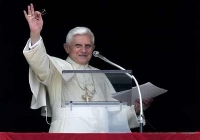Pope Benedict XVI departs on his pilgrimage to Latin America
Pope Benedict XVI departs on his first pilgrimage to Latin America a test of the 80-year-old pontiff's stamina and how he intends to deal with pressing challenges to his church in the region.

The Vatican is promising he will deliver a tough message to politicians on poverty and crime during the five-day visit to Brazil,the world's most populous Roman Catholic country,as well as try to strengthen a church battling to retain its leading role.
The German-born pope plans to lay out his strategy when he opens a once-a-decade meeting of bishops from throughout Latin America in the shrine city of Aparecida, near Sao Paulo, Brazil, South America's largest city.
The Vatican's No. 2 official said Benedict will isse a "strong message" on poverty, social inequality, drug trafficking and violence and on the exodus of Catholics joining Protestant evangelical churches.
"We hope these messages are heard, not only in the Catholic communities but by the political class," Cardinal Tarcisio Bertone, the Vatican's secretary of state, told reporters.
Benedict's predecessor, John Paul II, visited Mexico and addressed Latin American bishops just three months after assuming the papacy. Benedict has waited two years for his first trip to a region where nearly half the world's 1.1 billion Catholics live.
The Vatican recently defended the pope, saying he was as concerned about poverty in the developing world as much as his predecessors. "It's not true that he's 'Eurocentric' as some claim," said Vatican spokesman the Rev. Federico Lombardi.
Benedict, who visited Brazil as a cardinal in 1990, will celebrate several open-air Masses, including the canonization ceremony for Brazil's first native saint, and visit a rehabilitation center for drug and alcohol addicts founded by a German-born Franciscan friar.
But the focus will be on his directions for countering the growing influence of evangelical Protestants as well as what the Vatican denounces as such secular trends as the recent legalization of abortion in Mexico City.
Millions of Catholics have left the church in recent years, attracted by evangelical churches which the Vatican describes as "sects."
Vatican opposition to Marxist-based liberation theology _ which views Christ as a mere social liberator is another issue. The Vatican set the stage for the trip with its censure of a prominent champion of liberation theology in the region, the Rev. Jon Sobrino, condemning some of his works as "erroneous or dangerous."
It was Benedict, who as John Paul's close aide Cardinal Joseph Ratzinger, led a campaign against liberation theology as a Marxist-inspired movement. It is still active with thousands of grass-roots communities working among the poor and the landless.
Still, Vatican officials say the scorecard is not entirely bleak.
A study released in Brazil this week indicated that the percentage of Catholics who had left the church had stabilized from 2000 to 2003, but also showed the percentage of Protestants continued to rise.
While the church has assailed the move in Mexico City to legalize abortion, they point to other countries such as Nicaragua which last year banned abortion in all cases.
The May 9-14 pilgrimage will be Benedict's first lengthy trip as pope.
Although he appears healthy and robust and has never missed a scheduled event, he said in an interview last year that "I have to say that I've never felt strong enough to plan many long trips."
Vatican spokesman Lombardi said the pope's schedule is light at the start of the trip to allow him to overcome jet lag.
Except for a stop in Ankara, Turkey, Benedict's travels have been confined to Europe. The only other trip scheduled this year is to nearby Austria.
Subscribe to Pravda.Ru Telegram channel, Facebook, RSS!


